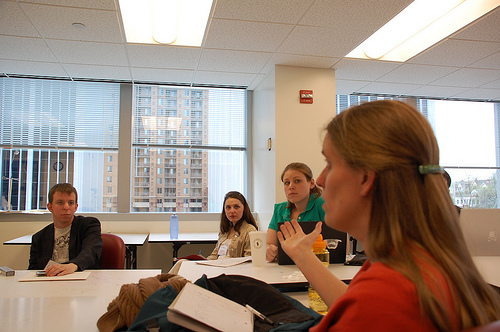Further Thoughts on the Flipped Classroom

Around a year ago I wrote an article entitled 8 Observations on flipping the classroom, in which I put forward the reasons I thought it not a great idea. I still stand by those arguments, although my attitude towards flipping the classroom as a general idea has mellowed somewhat. Let me explain.
Class discussion Photo by Andrew Feinberg http://www.flickr.com/photos/andrewfeinberg/
My understanding of flipping the classroom, as originally conceived and still talked about as far as I can see, is that it’s a situation in which the teacher records his or her “lectures” so that their students can watch them out of lesson time, freeing up time in the classroom for discussion, interaction between teacher and student, peer learning etc etc etc. Read the article I just referred to for the reasons I think the whole idea is ridiculous, despite the fact that some clearly very clever people have managed to make it work.
My main arguments against it are that:
- good teachers don’t lecture for very much of the time, if at all;
- I don’t know of any teacher who has time to record and polish up videos of their lectures and prepare lessons and do their marking and have some semblance of a private life;
- Lectures are known to be the least efficient means of transmitting knowledge.
I could go on.
However, if we broaden the concept of flipping the classroom to encompass more than video lectures, it all makes perfect sense. Basically, the idea is that you give your students something to do between this lesson and the next, so that they will be better able in the next lesson to take an active part in it, through discussion, suggestion-making, assessing their peers’ work, and so on. Put like that, it’s pretty amazing isn’t it? I mean, it must make perfect sense, because that’s exactly what good teachers have been doing for eons.Pardon my sarcasm, which I know is unbecoming a gentleman, but really!
If you forget about video lectures for a moment, what else is possible?
Tools and ideas to transform education. Sign up below.
- Ask students to watch a forthcoming TV documentary;
- Tell them to listen to a forthcoming radio debate.
- Make a video of a discussion between you and someone else, and tell them to watch that. (I once made a video of a local businesswoman being interviewed by myself. It worked pretty well.)
- Tell them to read a newspaper article.
- Tell them to read a particular blog post.
- Tell them to listen to a particular podcast episode.
- Flip This (scottjelias.net)
- Flipped Classrooms: Beyond the Videos (dougwoods.co.uk)
- Flipped Classroom: The Full Picture Workshop (slideshare.net)
